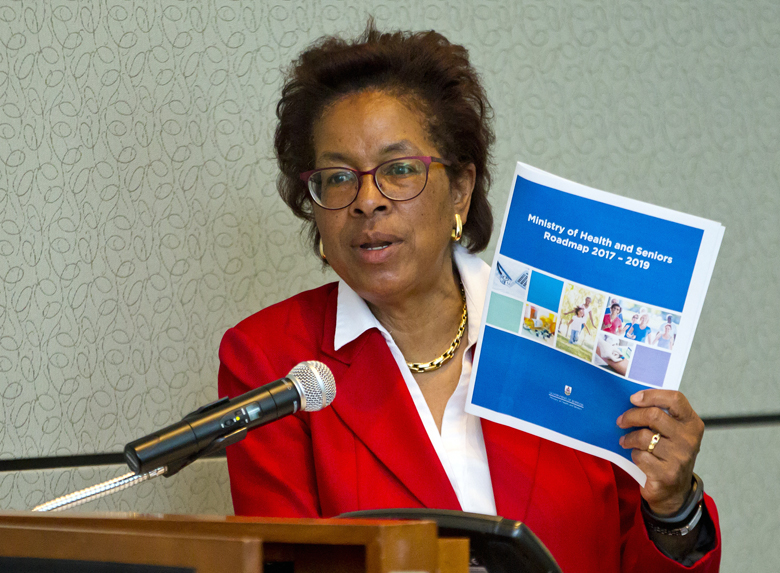Minister Atherden Speaks To ABIC Gathering
Minister of Health, Seniors and Environment Jeanne Atherden recently spoke to an Association of Bermuda International Companies [ABIC] gathering regarding the Bermuda Health Strategy and Action Plan, saying “although we are moving forward, it is important to remind ourselves that there is no perfect formula for a health system.”
Minister Atherden said, “As you know, the Ministry of Health and Seniors is one of the largest Ministries in the Government. Our mandate is very significant and we oversee a sector that represents 11.6% of the Island’s GDP.”
“We fully appreciate the enormity of our task though, understandably, it can be hard for the public and our stakeholders to get the breadth of the Ministry’s mandate.
“For this purpose, we have produced the Ministry’s Roadmap 2017–2019 which provides a snapshot of the Ministry’s mandate and an overview of the strategic initiatives underway. Copies of the Roadmap have been shared with you today and it’s also available on our website.”
“We have made strides to reorganize payment systems to focus on value and outcomes, improved benefit design to reduce unnecessary hospitalizations, and are developing a healthcare workforce plan to address the needs of 21st century Bermuda.
“But, although we are moving forward, it is important to remind ourselves that there is no perfect formula for a health system. All models have advantages and disadvantages, and reform is often a process of deciding what sacrifices a community is willing to make.
“What is clear to Bermuda is that we could not afford the trajectory it had been on for 20 years. With an under-regulated sector health costs have increased exponentially and numerous past attempts at reform failed.
“As a result, the problems we have today are just bigger, more expensive versions of the problems that plagued us 20 years ago, when the seminal Oughton report was commissioned.”
The Minister’s full statement follows below:
Good morning
It is a pleasure to be here today to speak to you once again about the Bermuda Health Strategy and Action Plan.
As you know, the Ministry of Health and Seniors is one of the largest Ministries in the Government. Our mandate is very significant and we oversee a sector that represents 11.6% of the Island’s GDP.
We fully appreciate the enormity of our task though, understandably, it can be hard for the public and our stakeholders to get the breadth of the Ministry’s mandate. For this purpose, we have produced the Ministry’s Roadmap 2017–2019 which provides a snapshot of the Ministry’s mandate and an overview of the strategic initiatives underway. Copies of the Roadmap have been shared with you today and it’s also available on our website.
You will see in the Annex [in page 11] that we have a number of strategic initiatives underway to reform and improve the quality and sustainability of our health system. These are outlined in several different documents, but this Annex collates them into a single resource, with the Bermuda Health Reform Strategy as the primary organizing point. And that is what I’m here to talk to you about today.
As many of you know, the Bermuda Health Strategy was launched formally in January 2016 to present the vision for reforms to the health system over a five-year period. The goal is to ensure Bermuda has quality healthcare that is accessible, affordable and sustainable, in order to achieve the Ministry’s vision of “healthy people in healthy communities”. The strategy is supported by the Bermuda Health Action Plan, which details specific actions we are undertaking to achieve this vision. Since that time, a further Action Plan was put in place to address key long term care issues as well.
We have brought a few copies of these documents, for those interested, though they are available on our web site.
You’ll be able to see from the Bermuda Health Action Plan document that the Ministry is working with key partners to implement initiatives to achieve the goals for health. Some of you may have attended the Chamber of Commerce talk by Dr Mark Britnell, and I’m pleased to say that we support the approach he presented and are already doing many of the things proposed.
For example, we have made strides to reorganize payment systems to focus on value and outcomes, improved benefit design to reduce unnecessary hospitalizations, and are developing a healthcare workforce plan to address the needs of 21st century Bermuda.
But, although we are moving forward, it is important to remind ourselves that there is no perfect formula for a health system. All models have advantages and disadvantages, and reform is often a process of deciding what sacrifices a community is willing to make.
What is clear to Bermuda is that we could not afford the trajectory it had been on for 20 years. With an under-regulated sector health costs have increased exponentially and numerous past attempts at reform failed. As a result, the problems we have today are just bigger, more expensive versions of the problems that plagued us 20 years ago, when the seminal Oughton report was commissioned.
However, on this occasion we have been absolutely determined not to fail, and our approach with the Strategy and Action Plan is working.
The most important indicator telling us we’re on the right track is the National Health Accounts report. This report monitors annual total health spending and the latest report shows that in 2011 health spending began to level off, and in 2015 total health spending actually went down by 1.1% for the first time on record. We finally bent the cost-curve – and we’re the first country to do so, compared to the OECD.
This tells us that we are moving in the right direction, but we’re the first to recognize that at $11,102 per capita health expenditure, we are still spending too much and have some way to go to achieve sustainability.
So what have we done to achieve this, and what are we doing to press further ahead?
The Bermuda Health Strategy has effectively set the stage to change the way we provide, pay for and use health services so we get better quality and better value. We all want and deserve that.
I stress that the way we use health services is a key part of reform, because for health costs to be brought under control and for premiums to become affordable, people need to be healthier, chronic diseases need to be managed better to avoid future costs, and we need to use health services responsibly, in ways that give good value not just more volume.
To make our health system sustainable all of us have to change, and every resident of this island has a part to play.
The Health Reform Strategy sets out 14 goals to improve quality, accessibility and sustainability. The Bermuda Health Action Plan set out 20 specific initiatives to achieve some of these goals. Specifically:
Cost-effective control of non-communicable diseases
Human resource development, and
Infrastructure and technology developmentTo date, we have made strides in all areas, though you’ll be aware that some of our reforms have struggled in the face of opposition from some sectors of our community.
To start with, chronic non-communicable diseases have become central to our combined efforts in cost-reduction. To this end:
We have introduced the Patient-centred Medical Home and the Enhanced Care Pilot programme targeting under- and un-insured persons with expensive chronic conditions who have been stuck in a revolving door of preventable hospitalizations. Altogether there are now over 100 persons enrolled in these programmes run by BHB and the Health Insurance Department to ensure these “super-users” care needs are addressed in primary care settings at a lower cost and with better outcomes. This is a win-win for everybody: patients get better and the system pays less.
Furthermore, chronic kidney disease is very costly to the island, and we all pay for it through our premiums. Currently there are approximately 170 patients on dialysis at the cost of $200 thousand a year, each. This $34 million expenditure has been targeted in our reforms. As of 1st June the price of dialysis will be decreasing to reduce the annual expense, and the coverage for kidney transplants will increase, making transplant more accessible for some of these patients so they can come off costly dialysis and have better quality of life and better productivity. A transplant can cost $130 thousand a year so it is an effective cost-saving measure.
In addition, long term care is a key priority area for the Ministry:
In 2016 we introduced a one-year Long Term Care Strategy to address ‘low hanging fruit’ and send a message to the sector that reform in underway. As a consequence, we now have legislation being drafted to improve care quality in residential and nursing homes; the mental health act is under review; more information for care givers and developers is available on our web site; and we introduced a ‘Personal Home Care’ benefit that has enabled persons to be cared for at home safely and more cost-effectively. This new benefit has been especially successful and one private insurer has already incorporated it to its own policies. We are working with other insurers to follow suit as it is great for patients and much less costly.
We have also begun a project to stimulate private sector investment in long term care. We know the need for additional capacity is great, as you will have seen from the recent and current bed crisis affecting the hospital. There are approximately 120 long-stay patients who do not need hospitalization, but have no other place to be cared for. The Government cannot build this capacity, so we are looking to the private sector and are in active discussions with developers and potential financers to mobilize this sector.
But long term care is not just about bricks and mortar. It’s also about support for care-givers and workforce capacity. As such, health workforce planning has been a key initiative and is under active consultation at present:
The situational analysis of Bermuda’s current healthcare workforce has been completed and our teams are working with expert advisors from the Pan American Health Organization on a proposed plan, in collaboration with healthcare professionals locally who are being consulted extensively to identify the Island’s workforce needs, given our ageing population and high incidence of chronic disease.
Better regulation of the health sector has also been a priority to improve quality and reduce costs. In this area we have had some wins and some set backs:
We have made headway in the regulation of healthcare professionals. The legislation regulating physicians was updated in 2016 to upgrade licensing standards and enhance disciplinary procedures. Ongoing oversight of complaints handling for all healthcare professionals has resulted in better handling of more complaints by the relevant boards and councils.
However, another important component has been the regulation of healthcare businesses, for which we have not yet been able to pass legislation. This is naturally frustrating as this regulation is paramount to control the unrestrained utilization of healthcare resources which has contributed so much to the increase in health spending. However, I remain committed to introducing the necessary regulatory controls, and hopeful that the Bermuda Health Council Amendment Act will ultimately be passed.
In addition, we have been working to improve our health information system, which is currently poorly integrated. This prevents the communication necessary to reduce health costs and improve outcomes. To this end:
We are on the cusp of introducing a Unique Patient Identifier to be used across all healthcare settings. This will be a universal, unique number assigned to anyone who touches the health system and will enable providers to better coordinate care. For example, a Unique Patient Identifier can assist in prescribing and managing medications, monitoring and using diagnostic tests, which can help prevent hospitalizations. Importantly, this Unique Patient Identifier is a necessary foundation for an integrated electronic health system, so it is a fundamental step towards this larger health reform goal.
In addition, we are working with the Pan American Health Organization on information systems for health and are poised to become a pilot site to advance these developments in 2017.
And last, but not least, is health financing reform; a vital part of the reforms needed to truly contain costs and make premiums affordable. In this regard, progress has been slower than I would have liked but we remain on the right direction. Specifically:
I have been pleased to announce that the standard premium rate and the HIP and FutureCare premiums will go down for the first time ever. I have tabled amendments to reduce these premiums by $4.07 a month as of 1st June. This will be a significant help to seniors and persons on low incomes struggling to retain their coverage.
Further, as I noted earlier, total health expenditure has gone down by 1.1%, indicating that we’re on the right track and finally bending the cost curve.
In addition, we have taken strong measures to contain costs in 2017. The price of dialysis has been reduced, the price of diagnostic imaging fees at the hospital will be brought down to the level charged in the community, and the price of long-stay beds at the hospital will be reduced for eligible patients. It is estimated that these combined changes will reduce costs by over $20 million in one year. If successful, it will represent the single, largest reduction in health costs our system has ever seen.
Looking forward, my technical teams will be tackling health financing reform aggressively this year to finally upgrade our health pooling strategies so that the system can be more efficient and more effective in controlling health costs. As an accounting professional, I’m looking forward to this more than anybody else!
I hope this provides a useful overview of how we have been progressing with the Bermuda Health Strategy and Action Plan. This is a snapshot of very complex changes that are difficult to design, negotiate and implement; but we are proud that we are making things better.
Nevertheless, I have to stress that these initiatives are barely the tip of the iceberg of what my Ministry does. Delivering health services at home and in clinics, implementing health promotion activities, educating the public, and many other mandated functions outlined in the Roadmap actually consume the majority of manpower and resources. I highlight them here simply to remind us that while health reform is underway, the usual care delivery and regulation has to continue to happen every day.
You will have heard of our successes with zika control, which contributed positively to Bermuda’s competitiveness as a tourist destination; and we were recently dubbed a “health fitness paradise” by a UK paper, thanks for the collaboration between the Bermuda Tourism Authority and the Department of Health to promote healthy activities, such as the Rail Trail event. All of these things contribute to improving the Island’s health.
I’d like to end by reminding us of the vision of the Ministry and the Bermuda Health Strategy: “Healthy People in Healthy Communities”. This vision highlights what, to me, is the most important bottom line for our community: the health of our people.
Yes, health the most important bottom line because we need people to be in good health so they can be economically productive members of society; so they can raise the next generation and care for the elders among us; and, of course, so they can enjoy a good quality of life.
I always remind my colleagues and anyone I speak to that health is fundamental to the core of our economy because sick people can’t work, sick children can learn, sick teachers can’t teach, and sick people require a tremendous resource investment that should be the exception, not the rule. This is why health is so vital to Bermuda’s prosperity, and why “Healthy People in Healthy Communities” is my vision for Bermuda.
As I hope you have seen, we’ve been hard at work in making this happen, and I have personally committed to keeping stakeholders and the public informed of developments.
We are using a variety of traditional and social media avenues to keep the public informed. Our web site has grown dramatically over the past six months containing more information on available resources and services. We have introduced a quarterly newsletter called “Vital Signs” to keep stakeholders abreast of developments. If you would like to receive it, please let us know today or email mohs@gov.bm. And our social media presence is growing; I invite you to follow us on #healthbermuda.
To end, I thank you for your continued interest in Bermuda’s health system and for your support as we move forward with further reforms needed to control costs and improve quality for all residents.
Thank you.
Read More About
Category: All






FORWARD TOGETHER.BERMUDIANS FIRST.